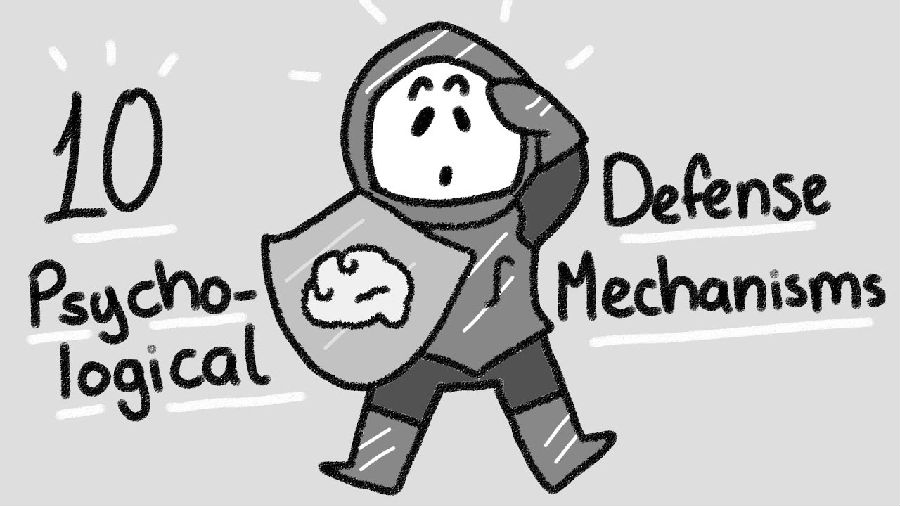(单词翻译:单击)
Defense mechanisms are the brains way of keeping us safe from being fully aware of unpleasant thoughts and feelings.
防卫机制是大脑保护我们不受悲伤想法和感受影响的方法。
Sometimes we can choose to use certain defense mechanisms like repression, denial and rationalization.
有时我们可以选择使用某种防卫机制,比如压抑、拒绝接受以及文饰作用。
Below is a list of ten of the most common defense mechanisms.
以下是十种最常见的防卫机制。
1. Displacement. The diversion of emotions such as anger from the original source to a substitute target.
1. 情感转移,即转移情感,比如来自源头和替代目标的愤怒。
For example, your friend says something hurtful and instead of confronting your friend, you later lash out at your sister.
例如,你的朋友说了一些伤人的话,但是你没有回击你的朋友,反而冲着你的姐妹发脾气。
2. Projection. The projection of one's own feelings, thoughts or motives onto someone else.
2. 观念具体化,即将某人自己的情绪、想法或动机映射到别人身上。
For example, a person who is cheating is under the impression that their partner is cheating on them.
例如,一个喜欢撒谎的人,在他们的印象中他们的父母也经常对他们撒谎。
3. Rationalization. Developing false though, plausible excuses to justify irrational and/or unacceptable behavior.
3. 文饰作用,即利用错误的想法和借口替自己的不当行为辩护。
For example, stealing from a corporate chain store such as Best Buy and justifying the theft by saying
例如,从百思买等连锁商店偷东西,然后替偷窃行为辩护到:
they make millions in profits so it doesn't matter.
这些公司有上百万的利润,偷这么一点没关系的。
4. Reaction formation. Behaving in a way opposite to how you feel.
4. 反应形成,即行为和感受相反。
For example, when a person is romantically attracted to someone but adamantly claims that they dislike the someone.
例如,当有一个人被另一个人所吸引,但是他们却坚称自己不喜欢这个人。
5. Regression. Reverting to childlike patterns of behavior.
5. 退行机制,即表现出幼稚的行为模式。
For example, a student gets a bad grade on their test and screams and cries at their parents or teacher.
例如,学生考试成绩不理想,他们会冲着老师或父母尖叫哭泣。

6. Repression denial. Pushing or burying thoughts and feelings that are distressing into the subconscious.
6. 压抑拒绝,即拒绝或埋葬那些潜意识里痛苦的想法和情绪。
For example, an addict will deny they have an addiction because they can function fine at working, at home.
例如,上瘾者拒绝承认自己有瘾,因为他们可以在家庭和工作中表现良好。
An example of repression would be a person who witnesses a crime being unable to remember the event.
压抑的例子有,一个亲眼目睹别人犯罪的人想不起来这件事。
7. Sublimation. The refocusing of unacceptable impulses, thoughts and our emotions into more acceptable ones.
7. 升华,即重新接受不可接受的冲动、想法和情绪。
For example, person who is experiencing aggressive impulses instead challenges that energy into rigorous exercise.
例如,攻击性冲动的人将这种能量变成严苛的训练。
8. Dissociation. The detachment from reality and from oneself and the finding of another representation of self to cope with extreme stress or conflict.
8. 分裂,即从现实和本我中分离,并寻找本我的另一种替代去应对极端的压力或冲突。
A person who uses dissociation as a defense mechanism disconnects from reality and lives in their own world
利用分裂作为防卫机制的人和现实分离,并生活在自己的世界中,
in which they do not experience unbearable thoughts, feelings or memories for a period of time.
在自己的世界中,他们无需经历那些不可承受的想法、情绪和记忆。
9. Intellectualization. Overthinking and the misdirection of focus when confronted with unacceptable situations, behaviors or impulses.
9. 理智化,即当面临不可接受的情况、行为或冲动时的过度思考或错误关注。
For example, a person who has been told the close family member has died
比如,得知自己的家人去世,
begins to focus on and over thinks the details of planning a funeral etc. instead of expressing their grief.
他开始关注并过度思考葬礼的细节,而非表达自己的悲伤。
10. Compensation. The counterbalancing of perceived flaws or weaknesses by instead emphasizing strengths.
10. 补偿。利用优势,使之与缺点或劣势相平衡。
For example, the person says they can't draw but they're really good at dancing.
比如,一个人说自己的不会画画,但是他们擅长舞蹈。
What defense mechanisms do you use? Share your thoughts with us below.
你使用的是那种防卫机制?请在下方留言分享。
Also don't forget to subscribe and check out our patreon. Thanks for watching.
还有不要忘记订阅我们的频道。感谢收看。


